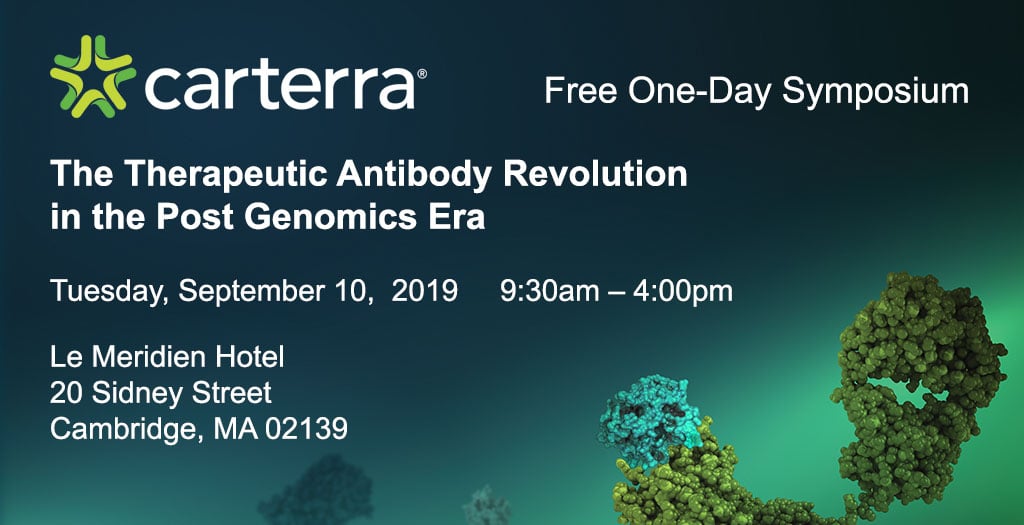
What You Will Learn
At this symposium, industry leading scientists will demonstrate how High Throughput SPR has facilitated a paradigm shift in antibody screening, enabling higher information content assays to be conducted earlier in the research pipeline to streamline lead selection.
You will learn how throughput advances in label-free SPR are facilitating the analysis of large panels of antibodies by providing a deep insight into the epitope landscape of antibody campaigns, informing decision-making in the drug discovery process.
Network with your peers. Lunch will be provided.
Register Here
Agenda
| 9:30 am – 10:00 am | Registration & Coffee | ||
| 10:00 am – 10:45 am |
 |
Yasmina Abdiche, PhD
Chief Scientific Officer
Carterra
|
Expanding SPR Throughput Orders of Magnitude to Accelerate Therapeutic Antibody Discovery |
|
Abstract: Surface plasmon resonance (SPR) is the de facto technique for measuring the binding kinetics and affinities of antibody interactions but has been relegated to a secondary role in discovery due to its limited throughput. Here, we introduce the Carterra LSA, a high throughput SPR platform that is disrupting antibody analytics by enabling screening and characterization to be performed in the same step. The LSA can measure the binding kinetics and affinities of hundreds of interactions in parallel and perform comprehensive epitope binning experiments on up to 384 antibodies per chip. With the additional advantages of minimal sample consumption and industry-leading analysis software, the LSA is streamlining the library-to-leads triage, saving time, cost and resources in generating clinically-ready molecules. |
|||
| 10:45 am – 11:15 am |  |
Tim Luetkens, MD Assistant Professor Huntsman Cancer Institute |
Using High-Throughput SPR to |
|
Abstract: T cells engineered to express chimeric antigen receptors have shown remarkable clinical activity against some hematological cancers. However, using CAR T cells for the treatment of other malignancies has proven difficult due to the lack of target antigens that are exclusively present on the malignant cells and absent from essential healthy tissues. Therefore, antigens showing some expression on healthy tissues but higher tumor expression are currently being explored as novel targets for CAR T cells. We have developed a workflow for the generation of minimally altered low affinity variants of antibodies to improve their selectivity for malignant over healthy cells. Utilizing single site saturation variant libraries, high-throughput SPR, and functional CAR T cell assays we have generated variants of an antibody specific for an antigen expressed on tumor cells and normal hematopoietic cells, resulting in altered affinities and increased selectivity for malignant cells. |
|||
| 11:15 am – 11:30 am |
Networking Break |
||
| 11:30 am – 12:00 pm |  |
Guangwei Yang |
From Epitope Binning to Function: Case Studies of Antibody Discovery and Characterization at Boehringer Ingelheim |
|
Abstract: Advances in antibody discovery and engineering have enabled the rapid generation of large antibody libraries with therapeutic potential. These large libraries require high throughput analytical techniques to characterize the interactions between the antibodies and the therapeutic targets. We are establishing new LSA-based processes by incorporating high throughput affinity screening and epitope binning into the early antibody discovery screening process. This new process, combining with functional analysis, enables a robust workflow for lead identification. Results from an ongoing project executing this new workflow is used to demonstrate the correlation between epitope bins and biological function, which in turn allows for more educated decision making for therapeutic antibody development. |
|||
| 12:00 pm – 12:30 pm |  |
Noah Ditto |
Strategies and Approaches for Detailed Label Free Kinetic Analysis using High Throughput SPR |
|
Abstract: While the epitope is typically the fundamental functional property for determining an antibodies mechanism of action, binding kinetics and affinity is a key parameter for ranking and predicting potency of clones within an epitope class. The detailed kinetic analysis of large numbers of clones has historically been difficult when the antibody samples are limited, was very time consuming, and consumed large quantities of antigen. The Carterra LSA is an ideal tool for high throughput kinetic screening and analysis, and solves these problems with the ability to analyze real time kinetics to 384 mAbs in parallel, from small amounts of crude sample, using a single injection of an antigen concentration series. This presentation will explore common approaches for performing high throughput kinetic screening and approaches to assay optimization. Topics will include strategies for preparing an ideal capture surface, assay format selection, how to create a concentration series which will allow for rate constant determinations over broad kinetic range, and strategies for data analysis and presentation. |
|||
| 12:30 pm – 1:30 pm |
Lunch |
||
| 1:30 pm – 2:00 pm |  |
Christine Bee, PhD |
Reshaping Antibody Selection: Early Characterization of Large mAb Panels Revamps Lead Identification and Technology Development |
|
Abstract: At Bristol-Myers Squibb, we use a variety of technologies to generate panels of several hundred to a thousand human antibodies per round of immunization. Capturing the full diversity of these panels without creating redundancy is critical to finding the optimal therapeutic candidate and using resources efficiently. Here, we show how epitope binning as a first tier screen allows to identify and capture the full epitope diversity generated by different transgenic animals and different antibody generation techniques. In combination with other data such as antibody sequences and epitope mapping, high throughput epitope binning and kinetic screens enable fast and optimized selection of antibody panels for MOA studies, while simultaneously providing a crucial evaluation of antibody generation technologies. |
|||
| 2:00 pm – 2:30 pm |  |
Noah Ditto Senior Applications Scientist
Carterra
|
Best Practices for Designing and Analyzing Epitope Binning Experiments Using the Carterra LSA and Epitope Software |
| Abstract: Here, we will describe practical guidelines for designing, executing and analyzing epitope binning assays using Carterra’s LSA and industry-leading Epitope™ software. While the traditional output of a binning assay is a 2D-heat map, this is an over-simplification because antibodies are probing the 3D-topography of an antigenic surface. Heat maps can often appear incomprehensible since there can be significant cross-talk of epitope clusters, but the true complexity of the epitope coverage can be confounded by artefactual complexity introduced by poor assay design or poorly behaved antibodies. Furthermore, epitope competition is not always a binary process of block or not block, and should instead be viewed as a spectrum of behaviors where two antibodies can perturb one another’s binding via steric and allosteric mechanisms, and these behaviors manifest in an assay as asymmetric blockade and displacements. Our Epitope software provides a variety of visualization tools to aid conceptualization of the true epitope diversity, including network plots, dendrograms, and custom communities. We will provide tips and tricks for leveraging the power of our software to groom a data set and remove unnecessary complexity while retaining sufficient nuance to most accurately describe the epitope landscape. | |||
| 2:30 pm – 3:30 pm |
Networking Hour |
||
To match our capacity in generating antibody libraries, we use the Carterra LSA for screening and characterization. Its high throughput capabilities match our highly automated antibody production workflow and shift analytics upstream to the very start of our antibody production. We routinely generate binding kinetics on hundreds of clones in parallel, directly from crude antibody or purified samples using minimal sample. Additionally, epitope binning studies on large panels of antibodies are now possible early in a program, allowing us to assess the epitope coverage of our libraries quickly and identify clones with uniquely desirable binding properties.
Aaron Sato, PhD, Chief Scientific Officer, Biopharma, Twist Bioscience
Antibody screening, characterization and epitope binning is a critical part of our therapeutic antibody discovery and development process. When we only used a BLI-based (biolayer interferometry) Octet system we were not able to perform full high-throughput kinetic analysis of unpurified or partially purified extracts or epitope binning on a large number of antibodies. The Carterra technology changed that and gave us the ability to perform very sensitive high-throughput full-kinetic analysis of unpurified bacterial extracts.
Raphael Levy, PhD, Director, Antibody Engineering, LakePharma